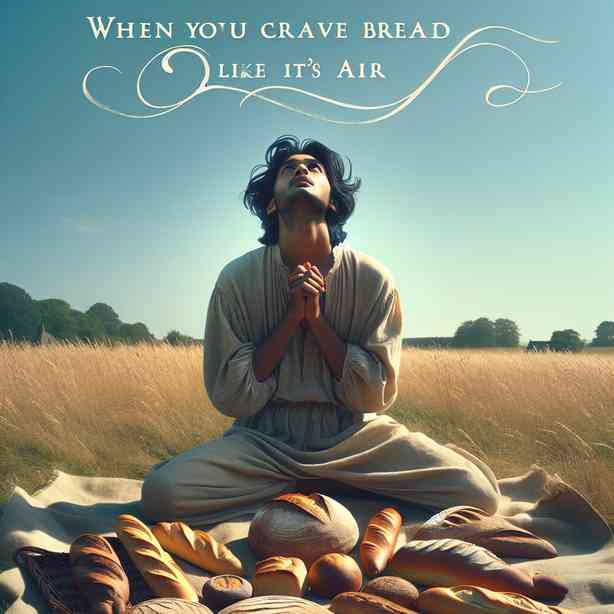
When you crave bread like it’s air, it’s important to understand the complexities behind this simple yet deeply ingrained desire. Bread is not just a food; it’s a cultural staple, a comfort food, and often a symbol of sustenance that connects individuals to their heritage and daily rituals. The cravings we experience for bread can stem from various physiological, psychological, and cultural factors.
To begin with, let’s explore the physiological aspects of bread cravings. Carbohydrates, the primary component of bread, are a significant source of energy for our bodies. When you consume bread, your body breaks down these carbohydrates into glucose, providing a quick energy boost. This rapid increase in blood sugar can trigger a gratifying response from the brain, releasing feel-good hormones such as serotonin and dopamine. As a result, when your energy levels dip, the body instinctively seeks out bread or other carbohydrate-rich foods to replenish energy quickly, leading to those intense cravings.
From a psychological standpoint, our emotions significantly influence our eating behaviors. Craving bread may be linked to comfort and nostalgia, invoking memories of home-cooked meals or happy gatherings with loved ones. The aroma of freshly baked bread can trigger endorphins, creating a sense of warmth and wellbeing. This emotional connection can make the craving for bread feel even more profound, as it often represents a form of solace in our busy, chaotic lives.
Culturally, bread is often considered a fundamental part of our diets across various regions. In many cultures, it holds a social significance that transcends mere nourishment. For instance, in Mediterranean and Middle Eastern cultures, sharing bread is a communal act that fosters community and connection. In these contexts, bread is not just food; it’s a symbol of hospitality and friendship. Hence, craving bread can also reflect a longing for that connection, especially during times of stress or loneliness.
Furthermore, the rise of dietary restrictions and trends has complicated our relationship with bread. The popularity of low-carb diets, gluten-free options, and various food fads can create a psychological struggle. You might find yourself craving bread particularly when you have recently restricted it from your diet. This scarcity can enhance the desire for bread, turning it into a forbidden fruit instead of a regular part of your meal.
Additionally, the way bread is made can significantly impact its appeal. The baking process itself can be a form of art, where the ingredients come together to create a product that is unique and flavorful. Artisan breads, baked with care, not only provide texture and flavor but also foster a sense of appreciation for traditional methods and crafts. When you admire the craftsmanship involved in baking bread, it adds a layer of depth to your craving, making it not just about eating but about experiencing something special.
However, it is essential to approach these cravings mindfully. Awareness of why and when you crave bread can help you make healthier choices about your consumption. For example, instead of indulging in overly processed bread, consider exploring whole grain or sourdough options that contain more nutrients and fiber. These alternatives not only satisfy the craving but also contribute positively to your overall health.
Additionally, balancing your meals can mitigate cravings for bread. Including proteins and healthy fats can help stabilize your blood sugar levels, preventing the spikes and crashes that lead to those intense cravings. For example, pairing your bread with avocado or lean protein can make for a satisfying meal that keeps you fueled without leaving you wanting more.
Experimenting with bread can also be a fun way to engage with your cravings. Home baking can be a rewarding hobby, allowing you to customize ingredients and styles to suit your taste. Creating your own bread not only gives you insight into the baking process but also fosters a deeper appreciation for this staple food. Plus, the act of kneading dough or watching bread rise can be therapeutic, providing a fulfilling outlet for creativity and mindfulness.
Should your bread cravings be accompanied by emotional distress or binge-eating behavior, it may be essential to seek professional guidance. A registered dietitian or mental health professional can provide personalized strategies to manage cravings in a balanced manner. Remember, cravings are a natural part of our relationship with food, and understanding them can empower you to develop healthier habits.
In conclusion, craving bread like it’s air is a multifaceted experience influenced by physiological, psychological, and cultural dimensions. It’s a reminder of our body’s need for energy, our emotional ties to food, and the significance of bread across various cultures. Rather than suppressing these cravings, embrace them with awareness, creativity, and mindfulness. By understanding the why behind your cravings, you can cultivate a healthier relationship with bread and, by extension, your overall eating habits.


